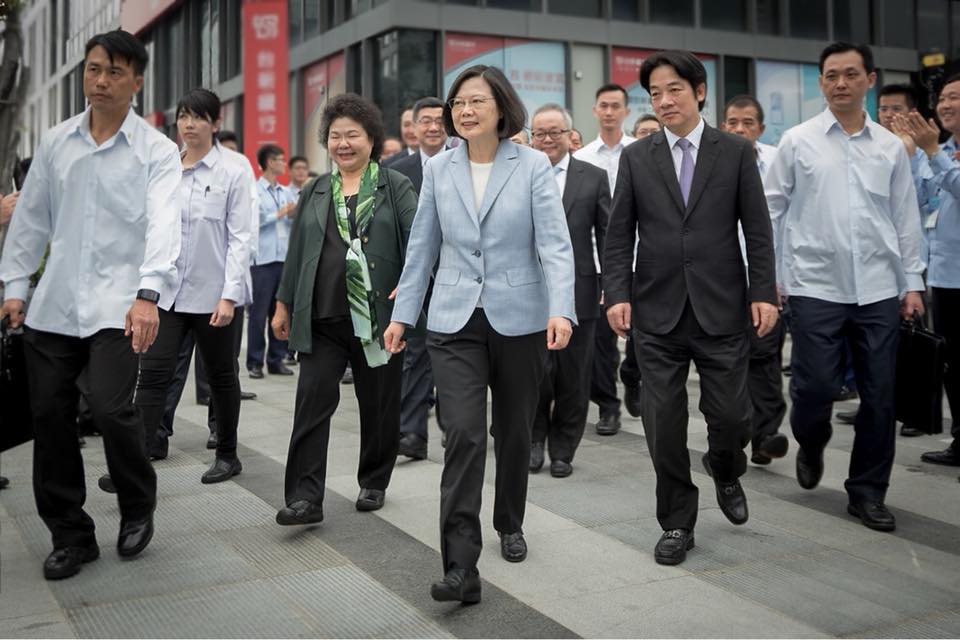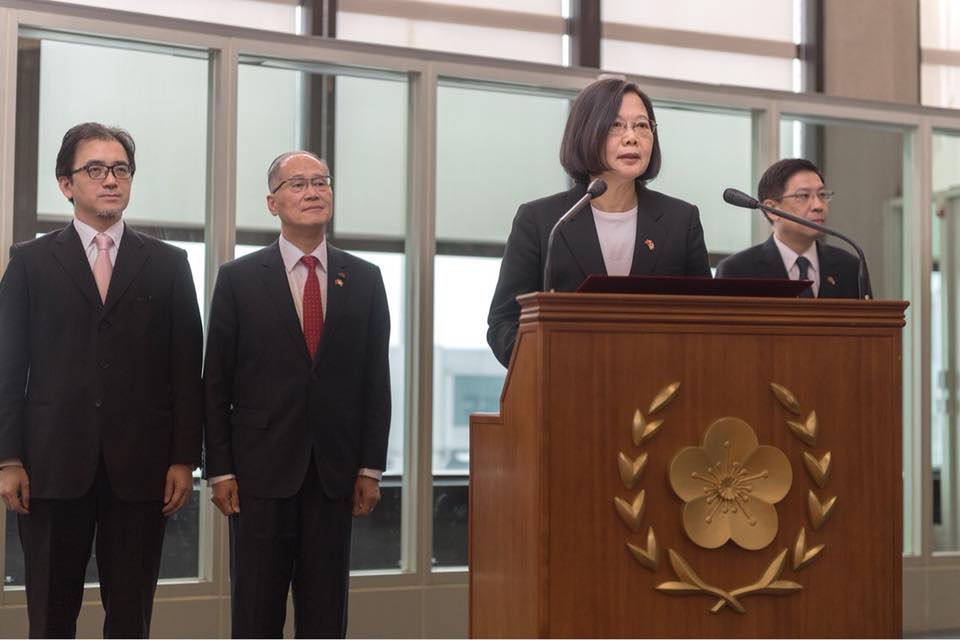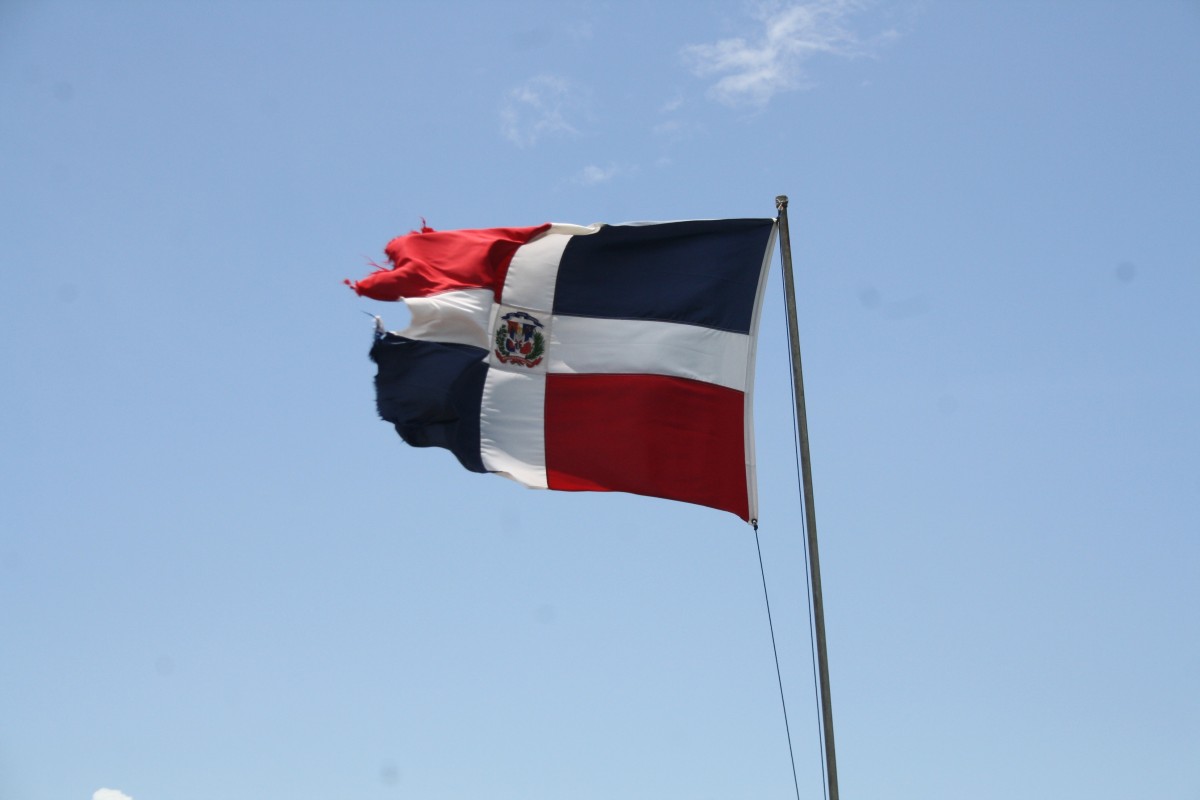by Brian Hioe
語言:
English
Photo Credit: Presidential Office
THE DOMINICAN REPUBLIC switching diplomatic recognition from the Republic of China (ROC) to the People’s Republic of China (PRC) should not be too surprising. Namely, China will always be able to outgun Taiwan diplomatically, by virtue of its political weight, its military power, and most significantly, its global economic power.
 Photo credit: Presidential Office
Photo credit: Presidential Office
As the Dominican Republic switching recognition to the PRC, it means that ROC only has nineteen remaining diplomatic allies, it is highly within the realm of possibility that further allies will follow suit. Fears are raised whenever Taiwan loses a diplomatic ally that this will lead to a chain reaction of other diplomatic allies jumping ship for the China. As with Panama switching breaking ties with Taiwan in June of last year, reportedly the Dominican Republic only gave Taiwan one hour’s notice. Panama’s switching diplomatic ties to the PRC was followed by Sao Tome and Principe in December 2016, making the Dominican Republic the first such incident this year.
However, it may be far from PRC apologism to suggest that it is very possible that this trend of Taiwan losing diplomatic allies is irreversible and inevitable. Taiwan is larger economically and in terms of population than all of its diplomatic allies.
In the past, Taiwan has engaged in “dollar diplomacy” to try and prevent China from poaching its allies, granting its allies economic incentives, sponsoring education initiatives for students from those countries in Taiwan—who, unfortunately are those that end up caught in the diplomatic crossfire between Taiwan and their home countries and are sometimes forced to cut short long-term study in Taiwan—among other measures. Yet China’s economy will always be larger than that of Taiwan, meaning that China can always offer more generous incentives to these countries in return for their abandoning Taiwan.
 Danilo Medina, president of the Dominican Republic. Photo credit: Presidential Office of San Salvador
Danilo Medina, president of the Dominican Republic. Photo credit: Presidential Office of San Salvador
Indeed, this is probable to have been the case with the Dominican Republic, with Taiwanese government officials claiming that China dangled an enormously large economic package to lure the Dominican Republic. If reports are to be believed, China is set to invest 3.1 billion USD in infrastructure projects in the Dominican Republic, continuing China’s international use of infrastructure projects as a means of advancing global economic and political power. On the other hand, Taiwanese government officials have pointed to China’s history of poorly built infrastructure projects and failing to carry out all of its aid promises to criticize erstwhile allies that have switched allegiance.
But it has long been an object criticism by the Taiwanese public that Taiwan spends a disproportionate amount of time and energy propping up diplomatic allies that are not, in fact, all that useful for Taiwan. It proves a recurring humiliation on the diplomatic stage of Taiwan continually making effusive claims of long-standing friendship beyond political and economic ties proven to be all talk. It is true that speculation has long ensued that the Dominican Republic would switch alignment to China, but this oftentimes seems unconvincing claims by government officials that it had always viewed the Dominican Republic as an unstable ally and anticipated this, when Tsai Ing-wen was meeting with senior Dominican Republic officials as late as last week and vice president Chen Chien-jen was sent to attend the inauguration of current Dominican Republic president Danilo Medina last year.
it has to be kept in mind Taiwan remains able to build non-official ties in the absence of official recognition that are not insignificant and that maintaining its few remaining diplomatic allies may simply be a waste of time and energy. In part, why a DPP administration spends so much time and energy on maintaining these diplomatic allies returns to that the DPP wishes to address sniping from the KMT on the issue that it fears may damage perceptions of its foreign policy among the public, seeing as ROC nationalism historically preserves a large pride of place for the ROC’s remaining diplomatic allies despite the KMT have shifting to a pro-PRC stance in the last decades.
 Photo credit: Presidential Office
Photo credit: Presidential Office
Likewise, it may not surprise either, that despite Taiwan’s claims to seek allies on the basis of shared democratic values, in many cases, the ROC’s diplomatic allies are, likewise, politically corrupt regimes.
One observes this, for example, in the case of Swaziland, which Tsai Ing-Wen visited in April, a poor country that remains primarily agricultural, has the world’s highest HIV infection rate and a life expectancy that has dropped to 48.7 years after 2000, and one of the world’s last remaining absolute monarchies. Similarly, in acknowledging the current government of Juan Orlando Hernández in Honduras last year, Tsai acknowledges a government widely accused of stealing the vote—ironic for a country which itself professes to be post-authoritarian after decades of KMT one-party rule, during which vote-buying practices were widespread. Honduras currently has the highest murder rate in the world, given its political instability, including killings of activists and journalists.
In such vein, the Dominican Republic is itself accused of having a large amount of unaddressed police killings by human rights groups such as Amnesty International or Human Rights Watch, as well as a large refugee issue, seeing as the government of the Dominican Republic moved to strip citizenship from citizens of Haitian descent or naturalization in 2013. Some reports claim as many 200,000 were stripped of their citizenship.
 Photo credit: PXHere/CC
Photo credit: PXHere/CC
More broadly, the Tsai administration is accused of hewing to a futile strategy of attempting to maintain Taiwan’s few remaining diplomatic allies and not attempting to rock the boat too much in terms of pushing for Taiwan’s membership in international organizations. Whenever Taiwan loses another diplomatic ally, calls take place for a change in tack in Taiwan’s diplomatic strategy, to adopt more creative means of seeking international recognition from the international community writ large instead of those nation-states which only maintain relations with Taiwan for the sake of playing Taiwan off of China in order to reap the most benefits.
On the other hand, it is generally to be wondered what exactly China hopes to accomplish through poaching Taiwan’s allies, since the move is likely to further reinforce among Taiwanese that China is not their friend, but goes out of its way to constrain Taiwan’s ability to participate in the international community. Yet it may take added pressure on the Tsai administration for any such shift in diplomatic strategy to take place, seeing as the Tsai administration has proven highly moderate, if not conservative in its foreign policy actions. We shall see then.

